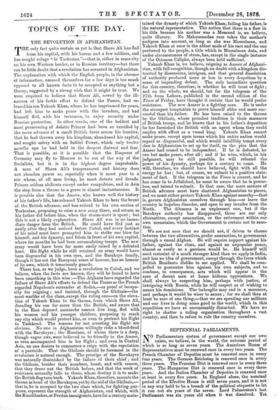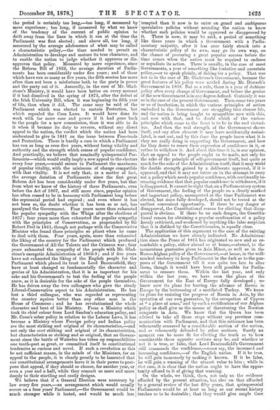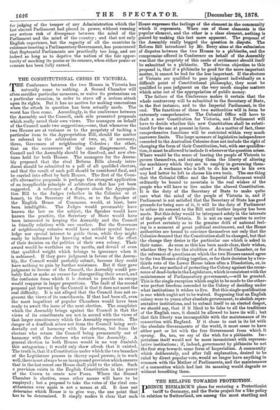SEPTENNIAL PARLIAMENTS.
NO Parliamentary system of government except our own exists, we believe, in the world, the extreme period of which is so long as seven years. The American House of Representatives must be renewed once in every two years. The French Chamber of Deputies must be renewed once in every four years. The German Reichetag is renewed once in every three years. The Prussian Diet is renewed once in every three years. The Hungarian Diet is renewed once in every three years. And the Italian Chamber of Deputies is renewed once at least in every five years. In England alone, the nominal period of the Elective House is still seven years, and it is not in any way held to be a breach of the political etiquette to let it run out six years of the seven. Lord Palmerston's last Parliament was six years old when it was dissolved. Yet the period is certainly too long,—too long, if measured by mere experience ; too long, if measured by what we know of the tendency of the current of public opinion to drift away from the lines in which it ran at the time the Parliament was first elected ; and above all, too long, if measured by the average adolescence of what may be called a characteristic policy,—the time needed to permit an Administration to develope and mature its true character, and to enable the nation to judge whether it approves or dis- approves that policy. Measured by mere experience, since the Reform Bill of 1832, the average duration of Parlia- ments has been considerably under five years ; and of those which have run so many as five years, the fifth session has more often than not been a misfortune both to the party in power and the party out of it. Assuredly, in the case of Mr. Glad- stone's Ministry, it would have been better on every account if it had dissolved in the spring of 1873, after the defeat of the Irish University Bill, when it was beginning its fifth year of life, than when it did. The same may be said of the Parliament which was elected to sustain Protection, but which repealed the Corn Laws. It would have done its work with far more ease and power if it had gone back to the people for a new commission, than it was able to do it -when it became its duty to reverse, without any direct appeal to the nation, the verdict which the nation had been understood to give in 1841 on the issue between Free-trade and Protection. There is hardly a case in which a Parliament has run as long as even five years, without losing vitality and authority and the strength which comes of popular confidence. And practically, we believe that nominally quinquennial Par- liaments—which would really imply a new appeal to the electors every four years,—would secure to Parliament the maximum of popular vitality, with the minimum of change compatible with that vitality. It is not only that, as a matter of fact, the average duration of Parliaments since the first great Reform Act has been considerably under five years, but that from what we know of the history of these Parliaments, even before the Act of 1867, and still more since, popular opinion has often ceased to be in harmony with Parliament long before the septennial period had expired ; and even where it has not been so, the doubt whether it has been so or not, has paralysed the Government. Four years more than exhausted the popular sympathy with the Whigs after the elections of 1837; four years more than exhausted the popular sympathy with the principles of Conservatism, as propounded by Sir Robert Peel in 1841, though not perhaps with the Conservative Minister who found those principles so pliant when he came to deal with them. Four years, again, more than exhausted the liking of the country for the Parliament which produced the Government of All the Talents and the Crimean war ; four years exhausted the sympathy of the people with Mr. Glad- stone's energetic Administration of 1868-9; and if five years have not exhausted the liking of the English people for the Parliament which placed its trust in Lord Beaconsfield, they have at least changed so fundamentally the character and genius of his Administration, that it is as important for his sake and his Government's to test the feeling of the people anew, as it is desirable for the sake of the people themselves. He has driven away the two colleagues who gave the steady Liberal-Conservative aspect to his Administration. He has lost a third colleague, who was regarded as representing the country squires better than any other man in the House of Commons ; and he has revolutionised the whole character and bent of his Ministry. From a Ministry which took its chief colour from Lord Sandon's education policy, and Mr. Cross's sober policy in relation to the Labour Laws, it has become a Ministry whose Foreign policy and Indian policy are the most striking and original of its characteristics,—and not only the mast striking and original of its characteristics, but characteristics so striking and so original, that no Govern- ment since the battle of Waterloo has taken up responsibilities one tenth-part as great, or committed itself to constitutional tendencies so curious and novel. If such a revolution as this be not sufficient reason, in the minds of the Ministers, for an appeal to the people, it is clearly greatly to be lamented that our constitutional arrangements leave it in their power to post- pone that appeal, if they should so choose, for another year, or even a year and a half, while they commit us more and more deeply to their startling and costly designs.
We believe that if a General Election were necessary by law every five years,—an arrangement which would usually secure us a four years' Parliament,—the Government would be much stronger while it lasted, and would be much less tempted than it now is to enter on grand and ambiguous speculative policies without sounding the nation to know whether such policies would be approved or disapproved by it. There is now, it may be said, a period of something like three years in which a Government with a Parlia- mentary majority, after it has once fairly struck into a characteristic policy of its own, may go its own way, on the chance of procuring a great popular success before the time comes when the nation must be required to endorse or repudiate its action. There is usually, in the case of most Governments, a year of something like tentative and uncertain policy,—or to speak plainly, of fishing for a policy. That was not so in the case of Mr. Gladstone's Government, because the great features of his policy were settled during Mr. Disraeli's Government in 1868. But as a rule, there is a year of dubious policy after every change of Government, and before the genius of the new Government is in any degree defined. Certainly it was so in the case of the present Government. Then come two years or so of incubation, in which the various principles of action embodied in the Government are struggling into clearer life, and the nation is being taught to sympathise now with this, and now with that, and to doubt which of the various principles which come to the front is to be in the end victori- ous. And then the real strength of the Government shows itself, and any alien element it may have accidentally assimi- lated, is cast out, and by this time the people know what it is they are really doing in supporting the Government, and how far they desire to renew their expression of confidence in it, or rather to withdraw it. And about this time it is, in our opinion, that an appeal to the people ought to be made, not only for the sake of the principle of self-government itself, but quite as much for the sake of the Administration itself, that it may wield the double strength gained by a deliberate approval, if it is approved, and that it may not totter on in the attempt to carry out a policy which needs popular confidence, with continually in- creasing evidence that that popular confidence is withdrawn, if it is disapproved. It cannot be right that, on a Parliamentary system of Government, the feeling of the people on a clearly marked and important policy, unsuspected at the time Parliament was elected, but since fully developed, should not be tested at the earliest convenient opportunity. If there be any danger of disapproval, the Constitutional reason for eliciting that disap- proval is obvious. If there be no such danger, the Constitu- tional reason for obtaining a popular confirmation of a policy keenly criticised, and weakened by anything like false suspicion that it is disliked by the Constituencies, is equally clear.
The application of this argument to the case of the existing Administration we have already indicated. No Administra- tion since the Peace of 1815 has originated so new and so re- markable a policy, either abroad or at home,—abroad, in the momentous guarantee given to Asia Minor, as well as in the Russo-Afghan policy of the Government,—at home, in the well- marked tendency to keep Parliament in the dark as to the pur- poses of the Government till it was quite too late to alter them, though it would have been still possible for Parlia- ment to censure them. Within the last year, and only within the last year, we have seen the plans of the
Government for the East of Europe fully developed ; we know now its plans for barring the advance of Russia in Europe by the buttressing of a mutilated Turkey. We know its plans for resisting the progress of Russia in Asia, by the operation of our own guarantee, by the occupation of Cyprus as "a place of arms," and by such a rectification of our Afghan
policy as shall give us the means of threatening the Russian conquests in Asia. We know that the Queen has been advised to take all these steps without any previous com- munication with Parliament, and that this reticence has been vehemently censured by a considerable section of the nation, and as vehemently defended by other sections. Surely no moment can be more fit for eliciting the truth as to how considerable these opposite sections may be, and whether or not it is true, or false, that Lord Beaconsfield's Government still commands the confidence,—some say, the increased and increasing confidence,—of the English nation. If it be true, he will gain immensely by making it known. If it be false, he will gain a warning of the utmost value to him ; while in that case, it is clear that the nation ought to have the oppor- tunity offered to it of giving that warning.
On the whole, we think, then, not only on the evidence afforded by the present situation, but also on that afforded by a general review of the last fifty years, that quinquennial Parliaments would be at least as long as our recent history teaches us to be desirable ; that they would give ample time for judging of the temper of any Administration which the last elected Parliament had placed in power, without running any serious risk of divergence between the mind of the Parliament and the mind of the country ; and that not only English experience, but the sagacity of all the countries in existence boasting a Parliamentary Government, has pronounced that Septennial Parliaments are practically too long, and are indeed so long as to deprive the nation of the fair oppor- tunity of marking its praise or its censure, when either praise or censure has been fully earned.




































 Previous page
Previous page